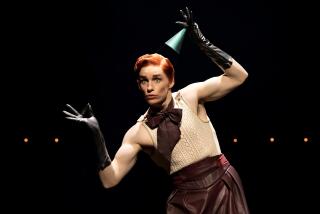Daniel Craig, Rachel Weisz review: In ‘Betrayal,’ it’s a man’s world
NEW YORK — Wielding silence as deftly as he harnessed speech, British playwright Harold Pinter wrote plays that have the precision of musical scores. Much of the joy in encountering these extravagantly minimalist works in performance is noticing where the stresses have been placed and interpretive liberties taken.
“Betrayal,” first produced in London in 1978, is the Pinter play that has lately been drawing the starriest interpreters. In Ian Rickson’s 2011 West End revival, Kristin Scott Thomas was like an icy cinder, coolly burning her way to the heart of this drama that lays bare the gamesmanship of marital infidelity.
In the current Broadway revival, which is as sleek and luxurious as an Aston Martin (and as jaw-droppingly expensive, with premium seats fetching over $400), the men dominate the action. Daniel Craig, the latest James Bond heartthrob who has helped make this Mike Nichols production a box-office record-breaker even before its official opening Sunday at the Ethel Barrymore Theatre, puts his 007 sang-froid to expert use.
PHOTOS: Arts and culture in pictures by The Times
Craig plays Robert, a cool customer who discovers that his wife, Emma (played by Craig’s real-life wife, Oscar winner Rachel Weisz), is having an affair with his best friend, Jerry (Rafe Spall). Rather than throw a fit and risk acknowledging that he’s been hurt, Robert decides to play his cards close to his vest — the better to outmaneuver opponents whose erotic objective is to keep him in the dark.
Divided into nine scenes, “Betrayal” is constructed like a psychological puzzle. The play begins in 1977 after the affair between Emma and Jerry has ended and concludes in 1968 just as it’s about to ignite.
Nichols’ staging maintains a heightened focus. Ian MacNeil’s sets, which fly in and out with the fluidity of memory, intimately frame the action. Projections fill us in on the shifting chronology, and the melancholy strains of James Murphy’s original music foster an elegiac mood.
Much like the characters themselves, the audience is actively engaged in trying to figure out who knows what at each juncture of the story. It’s a tricky business, made even trickier because in Pinter’s hyper-masculine world nothing is weaker than showing emotion.
Intense feelings, of course, can’t be erased, though they can be disguised. Yet Pinter, a comic playwright with a taste for shadowy menace, was acutely aware of the threadbare nature of our charades. Imperturbability is the mask that inevitably falls off.
CHEAT SHEET: Fall arts preview 2013
What gives Nichols’ handsome production its frisson is the way the men flamboyantly betray their stiff upper lips. London gentlemen in the book business, they epitomize urbane sophistication yet can’t completely hide their caveman hearts.
In Craig’s portrayal, Robert’s fury comes into view like a shark fin skimming the surface of the water. The more he controls his wrath, the more dangerous it becomes. When he makes love to his wife after a visit from Jerry, who has no idea that Robert is in on their secret, he descends on her like she were his prey.
Spall, whose performance is the most thrilling in the cast, reveals the narcissism of Jerry’s romantic fervor. He seduces not because he’s helplessly in love but because he has an itch to control.
If Emma’s character is hard to judge here, it’s partly because the production treats her like a figment of the male imagination. Ann Roth’s costumes turn her into a fantasy object whenever possible. She flounces about in an Italian country maiden get-up at one point and swoons around in a long-flowing hippie frock in the final scene.
PHOTOS: Hollywood stars on stage
For much of Weisz’s performance, Emma’s eyes are frosted glass. Yet the character’s inscrutability isn’t a particularly powerful stance. Unlike Craig’s Robert, who appears opaque for the same reason an invading soldier dresses in camouflage, Weisz’s Emma, perpetually in retreat, seems to be acting more in defense than offense.
Her portrayal zeros in on the disappointment that is motivating Emma’s secrecy. This sought-after object of desire understands that she is in fact the odd man out.
In Nichols’ reading of the play, there is the suggestion that the men might prefer to be with each other. The homoeroticism of the production isn’t explicit until the last scene, but it retroactively adds weight to a remark Robert makes to his wife earlier in the play after finding out about her affair with Jerry: “To be honest, I’ve always liked him rather more than I’ve liked you. Maybe I should have had an affair with him myself.”
One of the play’s best scenes, set in an Italian restaurant in which Robert takes out his frustration on Jerry by blowing up at the waiter (Stephen DeRosa), strongly implies that Robert is more heartbroken over Jerry than Emma. Craig exposes the sadness beneath Robert’s displaced anger while Spall throws into relief Jerry’s self-protective bewilderment.
Nichols takes risks with his interpretation but maintains the necessary ambiguity of the situation. His production would have been stronger, however, if he had allowed Weisz’s Emma to play hardball with the boys. Kristin Scott Thomas would have given Craig and Spall a real match.
But this “Betrayal” is a decidedly male affair, and Craig and Spall live up to the expectations that have surrounded this most anticipated production of the New York fall season. Whether the work justifies such exorbitant ticket prices is another story.
Broadway shouldn’t become the playground of the 1 percent, and a Hollywood franchise star who doesn’t need the money (and happens to be a superb stage actor) shouldn’t allow this to be done in his name.
More to Read
The biggest entertainment stories
Get our big stories about Hollywood, film, television, music, arts, culture and more right in your inbox as soon as they publish.
You may occasionally receive promotional content from the Los Angeles Times.







